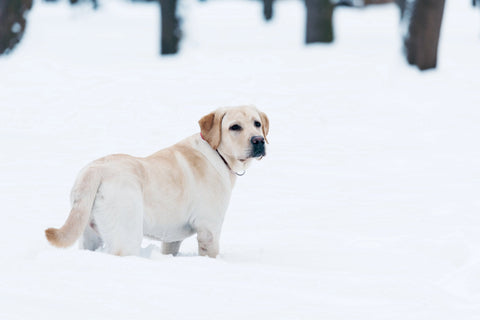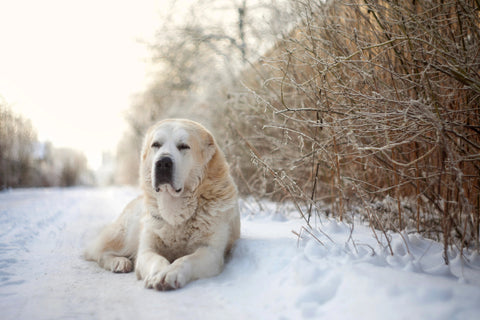Cheese is a popular training tool or special treat for your dog. But can dogs eat cheese...and should they?
In this article, we will explore whether dogs can eat cheese and identify the good and bad cheeses for furbabies. Plus, we’ll share some cheese alternatives to make sure your dog is safe, happy, and healthy.

Should Dogs Eat Cheese?
Cheese is high in fat, and giving your dog too much of it on a regular basis might make them gain weight and become obese.
The American Kennel Club notes that giving your furbaby low-fat cheeses like mozzarella, cottage cheese, or soft goat cheese is preferable. Compared to other cheeses, cottage cheese has reduced fat and sodium content, lowering the risk of obesity. Intestinal discomfort is also less likely to occur since cottage cheese contains less lactose.
Dogs may be sensitive to a compound called roquefortine C, which is produced by the fungus used to create some blue and soft cheeses. This substance, according to Blue Cross, can result in nausea, diarrhea, fever, and even seizures in dogs.
After giving your dog cheese, it is crucial to watch over them to make sure no unfavorable responses occur. If your dog exhibits any symptoms of digestive problems or allergic reactions, stop giving them cheese right away and call your veterinarian.
Remember that cheese should never replace your dog's regular meals. While cheese may offer some nutrients, it does not offer dogs a comprehensive and balanced diet. Instead, it should only be considered as a treat or a supplement to their regular diet.
Here is a guide of good and bad cheeses for your dog:
Big No-No Cheeses
While some types of cheese can be a suitable and safe treat for dogs, there are certain types of cheese that are not recommended for dogs due to their high-fat content or other potentially harmful ingredients.
- Feta: high in salt and fat; contains a type of mold called Mucor miehei which can be harmful if consumed in large quantities
- Brie: high in fat; made using a mold called Penicillium camemberti which may lead to serious health problems, including tremors and seizures if consumed in great amounts
- Provolone: may contain added ingredients like spices, garlic, or onions which can damage a dog's red blood cells, leading to anemia
- Blue cheese: contains a type of mold called Penicillium roqueforti which can be toxic to dogs
- Goat cheese: high in fat and may have added ingredients like spices, herbs, or garlic
- Cream cheese: high in fat and calories and contains added sugars
- Any cheese with herbs or spices/processed cheese: high in salt and contains additives and preservatives
"While cheese may offer some nutrients, it does not offer dogs a comprehensive and balanced diet. Instead, it should only be considered as a treat or a supplement to their regular diet."
Ok Cheeses
There are several types of cheeses that can be considered as "ok" for your furbaby if offered in moderation. These cheeses are typically lower in fat and lactose and less likely to cause digestive issues in dogs.
- Ricotta: a low-lactose cheese and is lower in fat compared to other types of cheese; made from the whey leftover from the production of other cheeses
- Gouda: a harder cheese that is typically lower in lactose than softer cheeses like brie or goat cheese
- American: made from a blend of milk, milk fats, and solids, with added emulsifiers to give it a smooth and creamy texture; high in fat and sodium, which can be problematic if given in excess
- String: made from mozzarella cheese and is formed into long, thin strings that can be peeled off in layers; relatively low in fat and calories, making it a good option for dogs that are on a weight control diet
Safe-for-Dogs Cheeses
These cheeses are lower in fat and salt, and higher in protein and essential nutrients. These cheeses are typically made from high-quality ingredients and are less processed than some of the other types of cheese.
- Cottage cheese: a soft and creamy cheese that is high in protein and calcium; low in fat and salt; can be served plain or mixed with other foods to add flavor and nutrition to a dog's diet
- Swiss: high in protein and calcium; low in fat and salt
- Parmesan: low in lactose and fat, high in protein, and a good source of calcium and protein; made from cow's milk, which is generally well tolerated by most dogs
- Cheddar: high in protein and calcium; low in lactose, making it a good option for dogs that are lactose intolerant
- Mozzarella: a mild and low-fat cheese that is high in protein and calcium; easy to digest, making it a good option for furbabies with sensitive stomachs
NOTE: When giving cheese to your furbaby, it is important to do so in moderation.
Dogs That Should Never Be Given Cheese
Some dogs should never been given cheese. If your dog falls into one of these categories, check with your vet before giving them this tasty treat.
Overweight Furbabies
Since cheese is heavy in fat and in calories, overweight dogs should not be given cheese. Overfeeding can cause obesity in dogs, which is linked health conditions, such as joint difficulties, heart disease, and diabetes. It is crucial to work with a veterinarian to create a healthy weight loss strategy if your furbaby is overweight. It may be necessary to feed your dog a particular diet that is lower in fat and calories, increase their activities, and cut back on high-fat treats.
Lactose-Intolerant Dogs
Cheese contains lactose, a form of sugar that can be challenging for dogs to digest if they are lactose intolerant. Due to a lack of the enzyme lactase, dogs who are lactose intolerant are unable to break down lactose into smaller, simpler carbohydrates. As a result, lactose stays in the dog's digestive tract, where it can ferment and cause discomfort and other digestive issues.
Furbabies with Upset Stomachs
Cheese is high in fat and can be difficult for dogs to digest, especially when they are dealing with gastrointestinal complications. Giving cheese to a dog who has an upset stomach can make their symptoms worse, increasing their discomfort and raising the risk of more serious health problems.
Furbabies with Kidney Problems
Cheese should not be given to dogs with kidney problems, as it includes high levels of protein and phosphorus that can greatly affect dogs whose kidney function has been compromised. The inability of a dog's kidneys to function properly prevents them from effectively filtering excess protein and phosphorus from the blood. Feeding cheese or other high-protein foods to dogs with kidney problems can lead to a buildup of waste products in the bloodstream, which can cause a range of symptoms and health complications.
"Multivitamin SoftSupps® for dogs can be a practical and efficient approach to guarantee that your furbaby is receiving all the vital vitamins and minerals they require."
Safe Alternative to Cheese Treats
Don’t want to risk giving cheese to your furbaby? Opt for Multivitamin SoftSupps® instead!
Multivitamin SoftSupps® for dogs can be a practical and efficient approach to guarantee that your furbaby is receiving all the vital vitamins and minerals they require to function well. These supplements include a range of nutrients that may promote immune function, joint health, skin and coat health, and their overall health and wellness. Giving your dog a daily multivitamin supplement can be especially beneficial for senior dogs or dogs with specific health conditions.
While cheese can be a pleasant treat for dogs, it is also high in fat and sodium, which when ingested in excess, can lead to gastrointestinal distress, obesity, and other health issues.
As they offer a balanced blend of necessary vitamins and minerals without the potential side effects of regular cheese consumption, Multivitamin SoftSupps® for dogs may be a better alternative treat than cheese.

Yes, dogs can eat cheese, but not all cheeses. And they should only eat it in moderation and under supervision. Although it can be a nice treat for dogs, cheese is not a necessary or comprehensive source of nourishment for them. As with any food or treat, it is critical to put your dog's health and nutrition first. If you have any questions regarding your dog's diet, always consult with your veterinarian.









